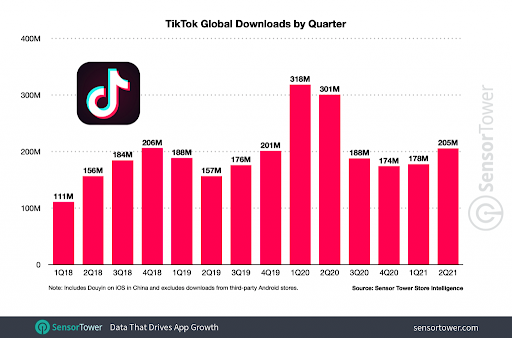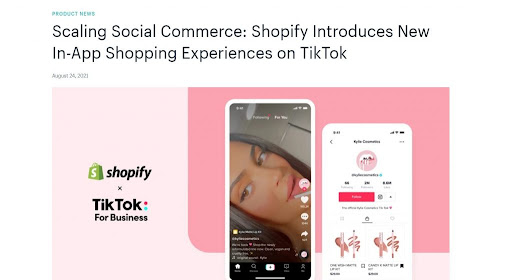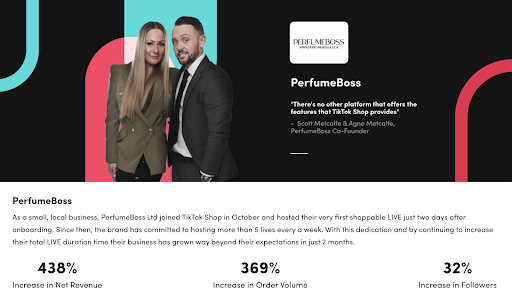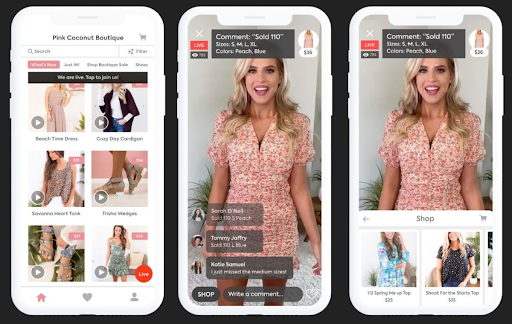The Rise Of TikTok Shop: Could Social Media Be The Key To Sale Success?
It’s no secret that TikTok’s popularity has exploded In the wake of Covid-19’s digital shift. As more consumers take to the platform as a form of entertainment and socialization, brands have also begun to use the app to their advantage in a competitive e-commerce environment.
On the back of its global influx of downloads, the platform has seen a spike in creator and brand-based content in just this year alone, rending it as the number one spot for content monetization and raising brand awareness.
“TikTok’s user base has exploded in the past couple of years, and the amount of time users spend on the app is extraordinary,” comments Debra Aho Williamson, Insider Intelligence’s principle analyst. “It has moved well beyond its roots as a lip-syncing and dancing app. It creates trends and fosters deep connections with creators that keep users engaged, video after video.”
As we move into a Social 2.0 era, TikTok is at the forefront of platform evolution. Stepping into a future where social platforms become a center for e-commerce opportunities, pioneering initiatives such as the TikTok Shop are just the beginning of a brand-dominated tomorrow for social media sites.
Stick with us as we discuss what’s in store for e-commerce retailers and post-pandemic startup brands as they navigate the benefits of utilizing social media platforms for e-commerce success, and read on as we reveal why TikTok could shape the e-commerce sector of tomorrow.
TikTok’s Rise To Fame
As of the beginning of 2022, TikTok’s popular platform had over 1 billion active monthly users, making it one of the most engaging social media apps in the last decade. As consumers continue creating their own content, the platform has seen hundreds of trending challenges, animations, and sounds and an influencer-based boom like no social media site has seen before.
After Apptopia confirmed that TikTok was the world’s most downloaded app in 2021, peaking in quarter one of 2020, experts have claimed that the pandemic’s natural digital shift has escalated the platform’s popularity within Gen Z and Millennial demographics.

(Image Source: sensortower.com )
While the lockdown may have increased the number of downloads on the TikTok app, it was a gradual celebrity-based interest in the platform that saw TikTok rise to fame.
“The success of any burgeoning app is often tied to the early adoption of a key celebrity.” reported The Guardian. “The fortunes of Snapchat have been closely tied to the whims of Kylie Jenner, Instagram has Selena Gomez, and Twitter now has a certain Mr. Trump. For TikTok, late-night comedian Jimmy Fallon may be the user that pushes it over the edge in the United States.”
Speaking about the video-based platform in 2018 on NBC’s Tonight Show, Jimmy Fallon first ignited consumer interest with TikTok, suggesting that viewers should take part in a series of viral challenges such as the #TumbleweedChallenge.
On the back of his influence, both consumers and brands quickly flocked to the platform in a chance to go viral.
As we jump forward to the present day, influencers and celebrities remain important trendsetters on the platform. The question is, what does this mean for brands looking to improve their visibility and awareness?
As influencers lead TikTok Shop Livestreams and create more Ad tagged content than ever before, it could be time for e-commerce brands to start profiting off of TikTok’s success.
How Is The Birth Of TikTok Shop Revolutionising E-commerce?
In 2021, TikTok partnered with Shopify in an attempt to facilitate the popularity branded content was receiving on the platform. As ad-based content raked in revenue for creators, brands, and TikTok alike, it’s no surprise that the social media site took ‘social media shopping’ one step further.
Moving forward from affiliate link sharing, TikTok now allows users to shop directly for products on the platform, revolutionizing conversion opportunities for e-commerce brands.
“Social commerce represents one of the fastest-growing channels for Shopify merchants, especially as more creators rely on these platforms to build their businesses,” Shopify stated when speaking about the partnership. “Shopify merchants with a TikTok for Business account will soon be able to add a shopping tab to their TikTok profiles and sync their product catalogs to create a mini-storefront that links directly to their online store for checkout.”

For e-commerce brands fighting it out in a newly competitive landscape, the TikTok shop could be the key to new sales victories.
On the back of the E-commerce sector growing by a third since Covid-19 alone, marketers continue to ramp up their site-based SEO and website copywriting strategy in an attempt to improve their industry success. However, could it be time to invest in a social media-based e-commerce strategy too?
In fact, TikTok users are 1.4x more likely than other platform users to purchase a product/service they discover in-app and a further 2.4x more likely to make their own content about said purchase, further advertising the brand to their own social circle after buying a product.
This has transformed the realms of e-commerce opportunity significantly, especially as brands can simply sit back and watch their consumers raise awareness when sharing and discussing products within the app.

Take The Perfume Boss as an example. Since joining the TikTok shop, they have seen a 438% increase in Net Revenue and a 369% increase in order volume based on Shoppable Live alone.
From well-established brands to small business startups, the beauty of TikTok is that any video/live can go viral, especially if you jump on content trends. Read on as we reveal how you can insert your own brand into TikTok’s selling algorithm and use the social media site as a new e-commerce platform for conversion success.
How To Use TikTok As An E-commerce Platform
There are a number of ways to utilize TikTok as an e-commerce platform. From conducting live merchant-led shopping events to partnering with the platform’s most popular influencers and content creators, here are some of TikTok’s creative opportunities for brands:
Merchant-Led Livestreams

If you enter the TikTok shop as a brand, the platform gives you the opportunity to present live shoppable events, where consumers can hear either you or a collaborator talk about products/services while they are listed to buy in the left-hand corner of the screen.
Working in the same way as televised shopping channels, consumers receive the chance to benefit from offers and live guidance while brands rake in consumer conversions.
Collaborations With Creators
Influencer led-purchasing is one of the most effective forms of brand marketing in 2023, as not only are consumers more likely to rely on their opinions, but they are also more likely to share influencer-led content with their friends, increasing the chance of virality.
Monthly Campaigns
TikTok Shop runs monthly campaigns and promotions, dependent upon content trends, seasonal holidays, and current brands leading the way forward.
Getting involved with TikTok-led trends provides you with more chances for visibility as promotional campaigns appear on a wide number of For You Pages.
The Future of Social Media Shopping
As we step into the future of social media shopping, TikTok will continue to pave the way forward.
According to Shopify, over 67% of TikTok’s users now feel inspired to make a purchase while using the app, quickly turning attention away from site-based shopping towards a social-media-dominated tomorrow.
Brands that want to remain popular amongst Gen Z and Millennial consumers must aim to incorporate platform-based experiences into their sales strategy in 2023. As consumer attitudes evolve, a new social-media generation demand fast-paced commerce, influencer-led partnerships, and a strong grasp of demographic trends before they have even surfaced.









